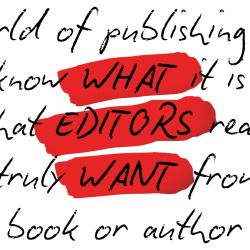Latest episode
More episodes
View all episodes

1. Faber & Faber - Louisa Joyner
49:47In the inaugural episode I visited Faber & Faber, the iconic publishers of authors like Sylvia Plath, William Golding, TS Eliot and Ted Hughes.This week's guest is Louisa Joyner, Faber's Publishing Director. We discussed her background as an academic and the difference (or rather lack thereof) between publishing commercial and literary fiction.Louisa's books include some of the most successful novels of recent times like Call Me By Your Name, The Shock of the Fall and Milkman, winner of the 2018 Booker Prize. We also discuss some of her non-fiction, such as working with the likes of Samantha Irby and Jay-Z.
2. Scott Pack
01:04:22Scott (@meandmybigmouth) and I met in the run up to Christmas to discuss our mutual love of experimental fiction (although not, as you'll hear, the novels of Haruki Murakami). Scott explains why he thinks newspaper’s literary review pages are massively restrictive, and how publishers throw away millions of pounds a year on publishing hardbacks. We discussed his time as Head of Buying at Waterstones and how it is books end up in bookshops (or don't).At the heart of this episode, and this podcast, is that crucial question: is an editor the author’s representative to the publisher, or the publisher's representative to the author?
3. Granta - Anne Meadows
48:02Lovers of literary fiction will know Granta Magazine and Granta itself, the publishers of authors likes Robert MacFarlane, Eleanor Catton, Ben Lerner, AM Holmes, Patrick deWitt and Han Kang.Anne Meadows is the Senior Commissioning Editor at Granta. We spoke about her incredible list of authors including Sandra Newman (The Heavens), Gwendoline Riley (First Love), Margo Jefferson (On Michael Jackson) and Sayaka Murata (Convenience Store Woman).Anne tells us about the disappointment on missing out on a book she'd have loved to work on, importing novels from countries like American and Japan into the UK, and how seeing your work in translation is like your son bringing home a new girlfriend.
4. Hodder Fiction & Sceptre - Emma Herdman
50:05Emma Herdman is the Editorial Director at both Hodder Fiction and their literary imprint, Sceptre. Hodder publish some of the biggest names in the business like Stephen King, Jasper Fforde, Graham Norton, David Mitchell and Siri Hustvedt.Emma and I spoke about our shared background as booksellers, and in particular at Waterstones Piccadilly. Emma went on to become a fiction buyer at Waterstones head office and then joined the literary agency Curtis Brown.We spoke about her list including books like THESE DIVIDING WALLS by Fran Cooper, HOMES & EXPERIENCES by Liam Williams and WHEN ALL IS SAID by Anne Griffin.Authors should always be aware of the market, but not led by it.
5. Influx Press - Kit Caless
48:24Kit Caless is the co-founder of Influx Press, the Hackney based publisher making books from London anthologies all the way to poetry from The Western Sahara. We met to discuss starting a press from scratch, how indie presses manage submissions and the importance of literary prizes. Writers, how do can a publisher know you’re there unless you make yourself available?
6. Quadrille - Susannah Otter
58:07Susanna Otter is a Commissioning Editor at Quadrille, one of the leading non-fiction publishers in the UK who specialise in areas like food & drink, craft, lifestyle, design, and popular culture.To date on this podcast I've tended to concentrate on fiction, so I was delighted to get the chance to talk to Susannah about non-fiction in general and in particular about the art of making cookbooks. Susannah is the editor behind cookbooks like Carbs by Laura Goodman and the Quality Chop House's cookbook. She's also worked with authors like Mel B, Simon Amstell and The Slumflower.We also discuss the London Book Fair, how Susannah got into publishing, and finding a balance between being a reader and an editor.